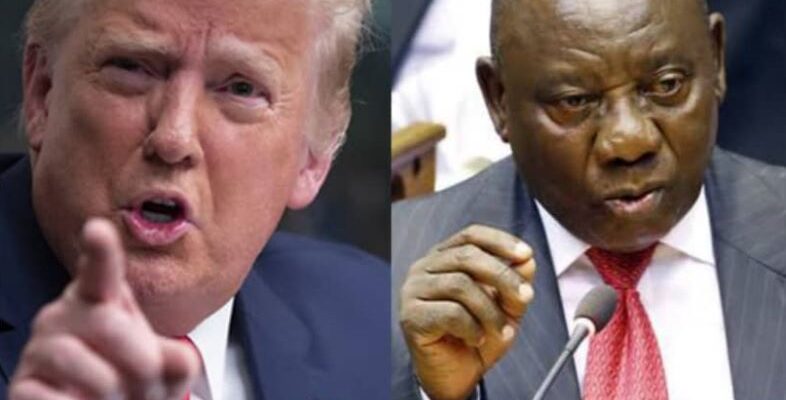
South African President Cyril Ramaphosa has pushed back against former U.S. President Donald Trump’s allegations that South Africa is confiscating land and mistreating certain groups, calling the claims inaccurate and affirming the country’s commitment to the rule of law.
Trump, in a statement on Sunday via his Truth Social platform, announced that he would suspend all future U.S. funding to South Africa pending an investigation into the country’s land policies.
“South Africa is confiscating land and treating certain classes of people very badly. I will be cutting off all future funding to South Africa until a full investigation of this situation has been completed,” Trump wrote. Later, in a briefing with journalists, he accused South Africa’s leadership of engaging in “horrible things,” though he did not provide specific examples.
In response, Ramaphosa took to his X (formerly Twitter) account on Monday to refute the allegations, emphasizing that South Africa remains a constitutional democracy governed by the rule of law, justice, and equality.
“The South African Government has not confiscated any land,” he stated. He clarified that the recently enacted Expropriation Act is not a tool for land seizure but rather a constitutionally mandated process designed to ensure equitable land access.
Ramaphosa also addressed Trump’s claim regarding U.S. financial aid, noting that South Africa does not receive broad funding from the United States. “With the exception of PEPFAR Aid, which constitutes 17% of South Africa’s HIV/AIDS program, there is no other funding that is received by South Africa from the United States,” he explained.
South Africa’s Land Debate and International Scrutiny
The issue of land ownership has been a long-standing and contentious topic in South Africa. The 1913 Natives Land Act, which dispossessed thousands of Black South Africans of their land under apartheid, remains a historical grievance. While efforts have been made to redistribute land since the end of white-minority rule in 1994, the process has been slow and complex.
Ramaphosa recently signed a bill allowing the government, under specific conditions, to offer “nil compensation” for expropriated land in cases deemed to be in the public interest. Pretoria has maintained that this law does not permit arbitrary land seizures and prioritizes negotiations with property owners.
However, some conservative figures, including billionaire Elon Musk and right-wing commentator Katie Hopkins, have expressed concern over the policy, drawing parallels to Zimbabwe’s controversial land seizures in the early 2000s. Musk, a South Africa-born entrepreneur and a known Trump ally, has previously voiced criticism of the country’s land reform policies.
Trump’s Influential Southern African Connections
Trump’s statements on South Africa’s land policies come amid his close ties with prominent Silicon Valley figures with roots in the region. His newly appointed artificial intelligence and cryptocurrency advisor, David Sacks, co-founded PayPal alongside Musk and has been vocal on conservative political issues. Another PayPal co-founder, billionaire Peter Thiel, who has played a significant role in shaping Trump’s administration, also spent time in Namibia when it was under South African control.
While the U.S. and South Africa maintain strategic trade and diplomatic relations, this latest development adds a new layer of tension to their engagement. Ramaphosa reiterated South Africa’s willingness to engage with the Trump administration on land reform and other bilateral interests, expressing optimism that further discussions would foster “a better and common understanding” between the two nations.

Comments